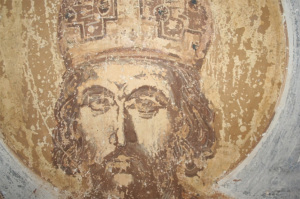How the Mathematical Proof for Christianity Differs From Circular Reasoning

A "circular argument" uses its own conclusion as one of its stated or unstated premises.
For example,
(1) The Bible affirms that it is inerrant.
(2) Whatever the Bible says is true.
Therefore:
(3) The Bible is inerrant.
In this example, no proof is offered to substantiate the claim. It already assumes what it is attempting to prove. It simply restates it, but it doesn't prove it.
On the other hand, if there was proof that the Bible must have come from God, that would be impressive. Proof is very different from circular reasoning. Proof is based on things like mathematics, science, and the testimony of multiple witnesses.
In the case of the Bible, we have a collection of 66 books with one unified theme and message. And we also have not just one, but two major world religions which point to the Bible as the basis of their faith. Christianity is built upon both the Old Testament and the New Testament, while Judaism is based upon only the Old Testament, or what they call the "Tanakh."
The books of the Tanakh were written hundreds of years before Jesus Christ was born in Bethlehem. Historians of all stripes affirm that Jesus of Nazareth lived and died roughly 2000 years ago. And the Tanakh has about 300 prophecies with specific details concerning the coming Messiah.
So what are the odds of Christ actually being the Messiah? Well, to answer that question we would need to know the probability of someone coming along and fulfilling the Messianic prophecies of the Tanakh.
If you want to discover the truth about the Bible and Christianity, then approach it this way. For the moment, don't assume that Scripture came from God and is therefore true; likewise, don't assume that it didn't come from God. Instead, be open to going wherever the evidence leads you. Rather than relying upon a circular argument concerning Christianity, rely upon the evidence. And see whether or not there is mathematical proof for Christianity.
Thankfully, the probability of fulfilled prophecy was actually calculated by Professor Peter Stoner. He was chairman of the mathematics and astronomy departments at Pasadena City College until 1953. He then went to Westmont College in Santa Barbara, California, where he served as chairman of the science division. What he discovered has nothing to do with circular reasoning. Instead, it provides real, tangible, mathematical proof based upon the evidence and the numbers.
Professor Stoner determined that the odds of one man fulfilling just 8 prophecies are one in one hundred quadrillion, or 1 in 100,000,000,000,000,000.
So just how big is that number? Well, here is one way to wrap your mind around it.
I live in Nebraska where I serve as a pastor. Imagine someone covering this entire state in silver dollars 6 feet deep. Then mark one coin and hide it anywhere in the state. Next, blindfold a man and ask him to go out and choose one coin. The odds that he would choose the marked coin are the same odds as getting 8 prophecies fulfilled in one man. Jesus Christ of Nazareth fulfilled roughly 300 prophecies which were written down in the Jewish Tanakh hundreds of years earlier.
Here are just 8 of those 300 prophecies:
(1) The Messiah will be born in Bethlehem. (Micah 5:2; Matthew 2:1; Luke 2:4-6)
(2) The Messiah will be a descendant of Jacob. (Numbers 24:17; Matthew 1:2)
(3) The Messiah will enter Jerusalem as a king riding on a donkey. (Zechariah 9:9; Mark 11:4-11)
(4) The Messiah will be betrayed by a friend. (Psalm 41:9; Luke 22:47,48)
(5) The Messiah's betrayal money will be used to purchase a potter's field. (Zechariah 11:13; Matthew 27:9,10)
(6) The Messiah will be spat upon and struck. (Isaiah 50:6; Matthew 26:67)
(7) The Messiah's hands and feet will be pierced. (Psalm 22:16; John 20:25-27)
(8) Soldiers will gamble for the Messiah's garments. (Psalm 22:18; Luke 23:34)
So what does this mean? Well, Jewish authors were inspired to write down prophecies which would serve as proof for the authenticity of the Messiah. How else could we know for sure, especially with so many false messiahs claiming to be the one? God wanted us to have proof, evidence, and certainty. Therefore, God gave the Jewish authors of the Tanakh a message from heaven. And Yeshua (Jesus Christ) came to earth and fulfilled the Messianic prophecies which pointed to His coming.
A circular argument merely restates it's premise, whereas real proof is based upon historical events which were foretold hundreds of years ahead of time. If you doubt the authenticity of the Tanakh, then research Judaism on this issue. And if you doubt the eyewitnesses who walked with Christ, then research it yourself. As part of your research, be sure to read Richard Bauckham's, "Jesus and the Eyewitnesses: The Gospels as Eyewitness Testimony."
In addressing the manuscript evidence for the New Testament, John Warwick Montgomery correctly states that "to be skeptical of the resultant text of the New Testament books is to allow all of classical antiquity to slip into obscurity, for no documents of the ancient period are as well attested bibliographically as the New Testament."
You won't find any prophecies in Hinduism which support Buddhism; or any prophecies in Christianity which support Islam; but you will find hundreds of prophecies in Judaism which prove the truthfulness of Christianity, and of Jesus Himself. After all, it was Christ who said, "I am the way and the truth and life. No one comes to the Father except through me." (John 14:6)
Christ didn't claim to merely be "one way." He claimed to be the only way. But if I were you, I wouldn't believe it without proof. Thankfully, God gave us plenty of proof when the eyewitnesses recorded the events which fulfilled the prophecies of the Tanakh.
God didn't have to prove it to us, but He decided to do so anyway. He wanted us to know that when we stand on Christ alone, we are standing on solid rock, and we belong to an everlasting kingdom. This is the destiny of God's people. But if you are not open to following the evidence and the mathematical proof, you could end up with those who want no part of Christ's eternal kingdom.
How do you know whether or not you are open-minded? Well, are you opposed to these prophecies from the Tanakh finding their fulfillment in the Messiah? If you approach this task with a heart that doesn't want the prophecies to be fulfilled in Christ, you can easily end up in a faulty loop of circular reasoning. And it's a loop you created for yourself when you closed your mind to examining the evidence objectively and with an open heart.
A person's moral resistance can lead him to ignore the mathematical evidence of the Messianic prophecies, which leaves a person in spiritual darkness. I guess you could call it a spiritual "black hole." And there is no getting out of it apart from reliance upon the One who created you and gave His life on the cross for your eternal redemption.
The One who created mathematical precision and certainty is the same One who will welcome you into His eternal family even though you have sinned against Him.
This is grace. And grace is from God.





























